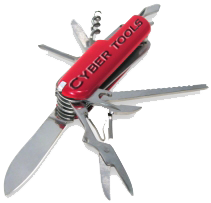Latest News
First 'All-hands' Meeting
On October 18th, the first All-hands Meeting for the NSF RII award took place in Baton Rouge. As members of the RII Advisory Board, Ron Hutchins, Jordan Konisky, and Vince McCoy were present. Two of the LONI Institute fellows attended the meeting as well. You can download presentations of Drs. Allen, Cortez, Gaver, Khonsari, and Seidel. Here are pictures and a few more details on the meeting. [Other News]
Deliverables and Milestones for Work Package 1
Infrastructure Deployment. Work with LONI staff to deploy fundamental grid services needed to support all activities in WP1-WP4. Deploy global file system spanning all LONI institutions (e.g. GPFS/Lustre), core Grid software (e.g., Globus Toolkit, Condor, GSI, etc) and extended Grid software (e.g. GRMS, SAGA, SPRUCE, Stork, HARC, etc).
Data Archival and Retrieval Services. Develop a LONI-wide distributed data archive, drawing on ongoing activities at the CCT, which utilizes the Reliable On-line ARchive (ROAR) and NSF funded PetaShare infrastructures for all CFD/MD simulation, experimental CBM2, hurricane/surge modeling, real-time data, and on-demand scheduling, and services to automatically archive data derived from the simulations and experiments. Develop services to efficiently and reliably retrieve the archived data.
Scheduling Services. Enhanced scheduling services will be developed in the support of automated, on-demand simulations needed, using SPRUCE, (e.g., for hurricane/surge forecasting) or for co-allocated or coupled jobs needed, using HARC, (e.g. for simultaneous CFD and/or MD simulations or coupled simulation/visualization processes). A generic task farm manager will be developed, providing a framework for task farming ensembles of scientific applications through both simple interactive interfaces, and in a fully-automated responsive mode.
High Availability. Uninterrupted availability will be enhanced across LONI for mission-critical applications and services. HA- OSCAR will be extended to address reliability, availability, and serviceability issues by automatically handling software and hardware faults.
Metadata Extraction and Indexing (Dua). LSU and LA Tech researchers will develop metadata services specifically for the science projects, so that archived simulation, experimental, and observational data can be searched, discovered, and retrieved for analysis and comparison.
[ Back to top ]
